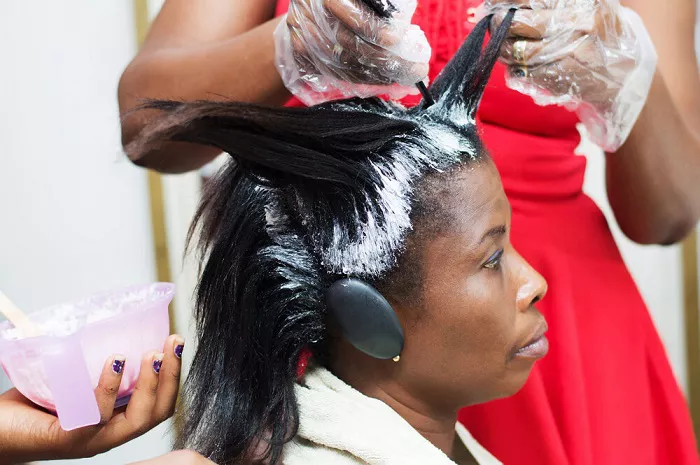Black British women are urgently calling for a ban on harmful chemicals found in many Black hair care products, particularly chemical relaxers linked to serious health risks including cancer. These popular products often contain sodium hydroxide (lye), a caustic chemical also used in drain cleaners, raising significant concerns about their safety.
Studies have linked endocrine-disrupting chemicals (EDCs) present in these products to increased risks of uterine cancer, fibroids, reproductive health problems, and early menstruation. The growing #NoMoreLyes campaign, led by feminist group Level Up, is pressuring major beauty companies such as L’Oréal to remove toxic ingredients from hair relaxers or at least improve transparency about their contents.
Seyi Falodun-Liburd, co-director of Level Up, told The Voice that ongoing research reveals hair relaxers leave Black women vulnerable to illnesses related to endocrine disruption, including uterine cancer and fibroids. The campaign demands safer products or the complete removal of harmful relaxers from store shelves.
Toxic Hair Products and Health Risks
The #NoMoreLyes campaign began after a 2021 Oxford University study found that Black women using lye-based relaxers seven or more times per year for 15+ years had a 30% higher risk of breast cancer. In a 2022 survey, 95% of Black British women expressed distrust toward brands selling lye-based relaxers. Many women report severe burns, hair loss, and lasting damage from these products—health effects that often precede more serious illnesses.
Despite growing evidence, changing haircare habits remains difficult due to deep-rooted family traditions and cultural practices. Falodun-Liburd explains that haircare rituals are passed down generationally, making it a complex issue beyond just health concerns.
Consumer Deception and Call for Transparency
Many products labeled “no lye” still contain sodium hydroxide under different names, misleading consumers who believe they are choosing safer options. The campaign calls for clear, honest labeling similar to warnings on cigarette packaging, so Black women can make informed decisions.
The open letter to L’Oréal has been backed by over 6,000 signatories, including public figures like MP Dawn Butler and author Renni Eddo-Lodge. Chemical relaxers work by breaking down natural hair proteins to straighten hair but often cause burns and scarring, adding to health concerns.
Personal Stories Highlight the Impact
Seyi Falodun-Liburd recalls receiving her first relaxer at nine, an experience many Black girls associate with growing up. However, adverse reactions including hair loss led her to cut off her hair and embrace a natural look.
Similarly, Richenda Polson from Kent was discouraged from using relaxers due to their damaging effects. After suffering hair thinning from improper hair dye use, she launched Golden Spice Cosmetics to promote healthier haircare routines emphasizing hydration, protein treatments, and protective styling.
Scientific Evidence and Legal Action
Research from the U.S. National Institutes of Health (NIH) shows women using chemical relaxers are twice as likely to develop uterine cancer. In 2024, Jenny Mitchell, an African American woman, filed a lawsuit against major relaxer manufacturers, including L’Oréal USA, claiming the products caused her uterine cancer.
The U.S. FDA announced plans to ban formaldehyde in hair straighteners, but delays have frustrated advocates demanding swift regulatory action to protect Black women’s health.
Expert Calls for Regulation and Warnings
Dr. Jasmine McDonald, an epidemiologist at Columbia University, urges clearer labeling and stricter regulations in the U.S., where standards lag behind the European Union. She warns of “replacement chemicals” whose long-term health impacts remain unknown, highlighting the need for ongoing vigilance.
Market Size and Consumer Protection Challenges
In 2021, Black British women spent £200 million on hair products, largely imported from the U.S. where ingredient regulations are less stringent. This complicates safety enforcement, as imported products may not comply with UK laws.
The UK’s Office for Product Safety and Standards (OPSS) assures consumers that all products sold domestically must meet strict safety requirements, and urges reporting of non-compliant products.
Cultural and Professional Pressures Persist
Many Black women continue to use chemical relaxers due to societal pressures to conform to Eurocentric beauty standards. Concerns about natural Black hairstyles being deemed “unprofessional” remain a barrier to change.
However, the natural hair movement, amplified through social media and supported by Black beauty publications, is pressuring brands to offer safer, chemical-free haircare options. Irene Shelley, Editor-in-Chief of Black Beauty and Hair Magazine, notes that many companies have reduced harmful ingredients, yet more action is needed.
The growing campaign to ban toxic hair products highlights a critical intersection of hair health, consumer safety, and cultural identity. As awareness rises, the demand for safer haircare solutions that protect Black women’s health and honor their heritage continues to gain momentum.
Related Topics:
- Losing Hair? Avoid These 3 Common After-Shower Mistakes for Healthier Strands
- Hair Medical Services Market Booms Amid Rising Consumer Awareness
- $10 Hair Thickening Serum Boosts Hair Growth and Health Fast


